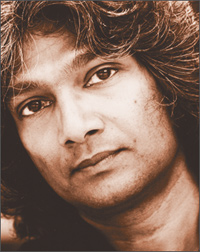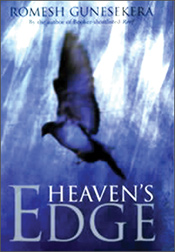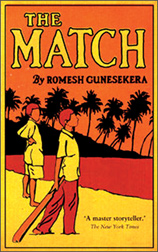|
Romesh GunesekerA:
Writing from London on Sri Lanka and her people
 |
|
Romesh Gunasekera; Sri Lankan born
fiction writer |
Romesh Gunesekera is a widely acclaimed Sri Lankan-born fiction
writer who has lived and worked in Britain since 1971. His first novel,
Reef was shortlisted for the prestigious Booker Prize in Gunesekera’s
adopted country, England. This novel raises a few questions in readers’
mind: Is this novel, a Sinhala man’s narration as a flashback from his
boyhood to young adulthood?
 Is it a Sri Lankan servant’s life story that Gunasekara narrates
through a boy, Triton who is a servant of Mister Salgado a protagonist
portrayed as a bourgeois Sinhala intellectual from a landowning family?
Did Gunasekara crafted his maiden novel on actual events or is it a
writer’s imagination presented as work of art but writing from London? Is it a Sri Lankan servant’s life story that Gunasekara narrates
through a boy, Triton who is a servant of Mister Salgado a protagonist
portrayed as a bourgeois Sinhala intellectual from a landowning family?
Did Gunasekara crafted his maiden novel on actual events or is it a
writer’s imagination presented as work of art but writing from London?
Introducing Gunasekara’s third novel, `Heaven’s Edge’, The New York
Times reported that `Exile and rootlessness lie at the heart of
Gunesekera’s fiction. This wistful, mysterious third novel is set in a
distant yet unspecified future in the author’s native Sri Lanka.’
Could a writer who is away for a good part of his life and writing in
English and living in London, recreate `stories’ about one’s native
country?
Regarding his latest novel, The Match which is set between Sri Lanka,
Manila and London, Gunasekara claims that it is not autobiographical but
`autogeographical.’ What is `autogeographical’ is the question!
The following interview given exclusive to Montage, is based on
edited extracts from an email trail between Romesh Gunesekera and Ranga
Chandrarathne.
Q: You have been introduced and recognized as a widely acclaimed Sri
Lankan-born fiction writer and poet. How would you like us to call you
and why?
A: I am a writer who was born in Sri Lanka and grew up elsewhere. I
don’t really mind what I am called in terms of background. All I would
like is for readers to find my books. Writers rarely like to be boxed
in. One box I don’t mind is the one marked `good writer.’
Q: You lived as a young teenager in Manila and lived and worked in
Britain since 1971? So can you introduce yourself as a Sri Lankan
writer?
A: The big question is what makes someone a Sri Lankan writer. I
don’t know the answer. In any case, I usually let other people introduce
me. My most recent novel `The Match’ is partly set in the Philippines
and caused a bit of a debate in the Manila newspapers about who is a
Filipino writer. After reading the novel some people thought, maybe you
don’t have to be a Filipino to be a Filipino writer. They felt “The
Match” had been written by one of them!
Q: Why do you think that your very first novel `Reef’ was
short-listed for Booker Prize and the Guardian Fiction prize in 1994. Is
it because you manage to provide a new perspectives to a Sri Lankan made
plot which is much alien to British standards of fictions or capable of
providing an exotic picture of your native country to western readers?
A: Hopefully it was because `Reef’ was thought to be a good book and
a special one. Triton, the narrator, is becoming recognized as a new
kind of character. He is not really like anyone else in fiction. C L R
James, the great essayist from the Caribbean, once said that new kinds
of characters appear very rarely and I think that is true.
I don’t know whether Triton is an example, but I hope he might be.
`Reef’ was also acclaimed in other countries and won a prestigious
prize in Italy, so I think the merits of the book are not linked to
British expectations.
 Q: Your last novel the `The Match’ is set between Sri Lanka, Manila
and London. We also feel that it reflects the moves of your own life,
and perhaps draws on the dislocation you may have felt growing up in an
expatriate environment. Is this true and is it an autobiographical
novel? Q: Your last novel the `The Match’ is set between Sri Lanka, Manila
and London. We also feel that it reflects the moves of your own life,
and perhaps draws on the dislocation you may have felt growing up in an
expatriate environment. Is this true and is it an autobiographical
novel?
A: The Match is not my personal story. It is not autobiographical,
but it is `autogeographical’, to coin a word.
In my previous book Heaven’s Edge I tried to invent a world. In this
particular novel, I wanted to take the geographical world that was well
known and invented the characters and the story. The novel deals with
the modern sense of dislocation and identity. In today’s world, there is
probably more dislocation than at any time in history. The novel
attempts to explore the meaning of it.
Q: Your stories, which have been translated into ten languages, are
located within Sri Lanka’s political turmoil, and geographical splendour.
But not in Sinhala, the majority’s language in SL?
A: All the translations have happened because publishers in different
countries have been interested in what I have written and have bought
the rights and translated the books. I would love my books to be
translated into Sinhala and Tamil. I am waiting for a talented
translator and a good publisher to come forward and propose it. Some
students at the University of Kelaniya did translate some of my stories
into Sinhala and I am very glad that happened.
Q: Your novel, `Heaven’s Edge’ published in 2003 is written using a
kind of Magic Realism style and you have used Sri Lankan place names
such as UVA as a protagonist’s name? Would you please explain?
A: I don’t see Heavens’ Edge’ is written as a novel that belongs to
magic realism. This book belongs to a tradition that of futuristic
novels likes `Brave New World and 1984’. Strangely enough last year, I
spent some time on the same island in Scotland where Orwell wrote 1984,
writing my next book.
`Heaven’s Edge’ does use some Sri Lankan place names and quite a lot
of Sri Lankan and Greek mythologies. I was very interested in the nature
of mythology and its human dimension. Some readers may find that they
can follow Marc’s journey in a Sri Lankan landscape (and find clues to
actual places) but the book is not specific to Sri Lanka. It is up to
the readers to make the connections they want through the text of the
novel.
The book tries to explore some of the most pressing questions at the
time of writing, and indeed now: is violence justified? Is it better to
remember what happened in the past, and learn from it, or better to
forget and hope the wounds would heal? This is a big question applicable
to many places, especially here in Sri Lanka.
The book is also about the nature of story-telling and uses elements
from the earliest epics to the first modern novels to take the reader on
a new journey.
Q: I want to follow up on your response regarding the `Heaven’s Edge.
It was shortlisted for the Best Book award in the Eurasia region for the
Commonwealth Writers Prize 2003, and named as a New York Times Notable
Book of the Year. But unfortunately a majority of Sinhala readers
(despite your good Sinhala name) are not aware of your work. Why, and
what is your opinion?
A: These books would be better known if they were translated into
Sinhala. Or films made of them. I think `Heaven’s Edge’, like `Reef’,
seems to have inspired a few other books which readers may be more
familiar with here, so perhaps in time they will discover the pleasures
of the original.
Q: According to some critics and readers `The Match’ did not reach a
wider readership or was considered a masterpiece compared to your first
novel. Is this true and if so why?
A: `Reef’ was published 15 years ago. It was widely translated and
still continues to be (the Chinese version came out last year). It is
now on the A level English Literature syllabus (Edexel) in England.
`The Match’ has some time to go as it was only published three years
ago. But it did get as good reviews as the first book. It was hugely
praised in a wide range of places from Wisden to the Times Literary
Supplement which also printed a picture of Mahela Jayawardene carrying a
pigeon off the field at the Oval (an event in the book). It is pretty
unusual to find a cricket photo like that in the literary pages.
It also has been a fore-runner of number of cricket-related novels
that have been published since then. But `The Match’ unlike other
cricket-related books seems to offer something for cricket fans, and
also those who have no interest in the game.
Q: Can you also write in Sinhala and what’s your knowledge of
bilingual writers emerging and working from far off places such as
Australia?
A: I am aware of some of these writers and very glad to see new
writers emerging. I am not a bilingual writer and wish I could write
equally well in two or three languages. All my fictions are written in
English.
Q: What is your next project and could you please share some
information about it?
A: I am writing my seventh book now. It is a novel and it is very
different from any of the others, but does have a strong Sri Lankan
link.
A post script: We forwarded two follow up questions to Mr Romesh
Gunesekara.
They are:
1. I would like to ask whether a writer who does not live in Sri
Lanka and does not write a majority language such as Sinhala or Tamil is
gifted enough to write a novel that has a `strong Sri Lankan link?’
2. To conclude I would like to know your response to a comment by one
of Sri Lanka’s most gifted bilingual academic, Hawai based Prof. Wimal
Dissanayake. As a part of an interview to Sunday Observer Professor
Dissanayake noted: “We also have a number of writers like Michael
Ondaatje, Romesh Gunasekara and Shayam Selvadurai who have made a mark
in the international world of letters that we should be proud of. But
that does not necessarily mean that they are writers who capture
important facets of our experience. Michael is a first grade writer.
He uses the English language with remarkable skill. Romesh and Shayam
also display a very commendable control of the English Language.
However, my problem is that they do not quite understand the deeper
structures of Sri Lankan society. They do not engage with the historical
forces in a way that some of Sinhala writers are able to. So my own
feeling is that the fact that metropolitan literary critics; fascination
of these writers does not necessarily mean they are the writers who best
represent our own experience and Sri Lankan sensibility.”
We received the following responses for our follow up questions from
Romesh GunesekerA: I only meant that, as with many of my books, there
will be some Sri Lankan characters in the next. On your second question,
sorry, I don’t usually comment on comments. It is for other readers and
critics to comment. |

